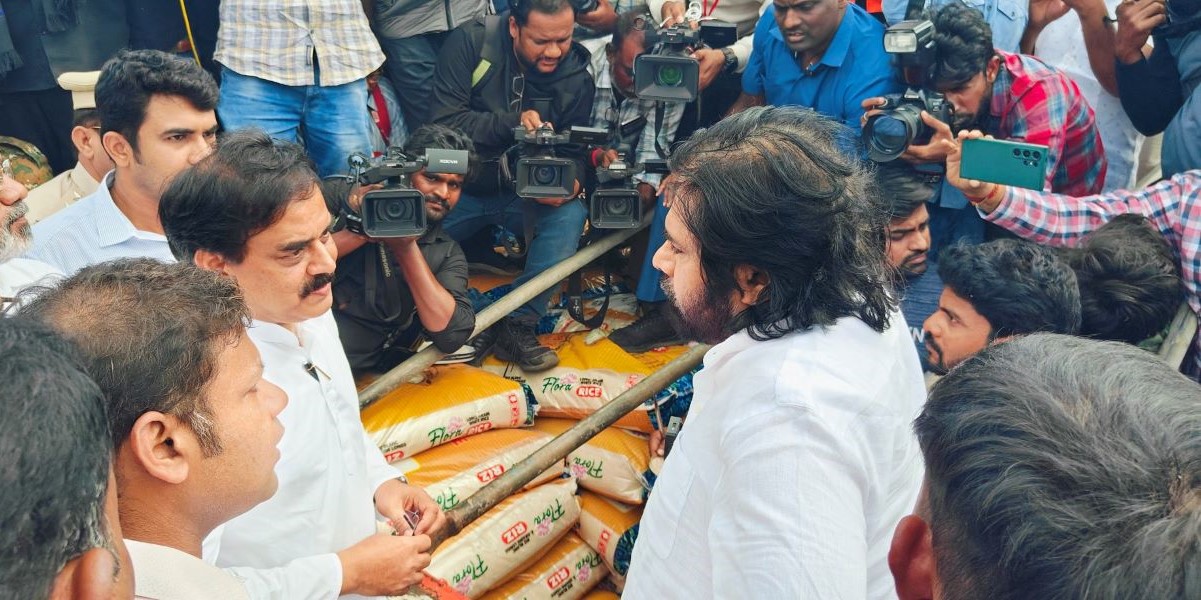Following the recent seizure of 640 tonnes of PDS rice by Pawan Kalyan off Kakinada port, Civil Supplies Minister Nadendla Manohar uncovered the smuggling of 483 tonnes of PDS rice at Visakhapatnam port's container freight stations
Published Dec 12, 2024 | 3:42 PM ⚊ Updated Dec 12, 2024 | 3:42 PM

Pawan Kalyan at the Kakinada port. (X)
The Andhra Pradesh government is unable to stop smuggling of PDS rice out of the state.
After the recent seizure of 640 tonnes of PDS rice by Pawan Kalyan off Kakinada port, Civil Supplies Minister Nadendla Manohar has uncovered the smuggling of 483 tonnes of PDS rice at Visakhapatnam port’s container freight stations.
In the first week of this month, officials seized 1,500 bags of ration rice in Uppugundur in Naguluppalapadu in Prakasam district.
In another incident, ration rice, which was being transported illegally from Bapatla was seized by the Nalgonda police in Telangana at the inter-state border at Wadapally.
There are allegations that the PDS rice from Telangana and Andhra Pradesh used to arrive in Kakinada for smuggling it out of the state and the country when the YSRCP was in power.
Even after the change in government, curbing illegal transport of rice is difficult, as those who were in key positions are still loyal to two leaders. “Even now, former YSRCP MLA Dwarampudi Chandrasekhar Reddy and his brother Veerbhadra Reddy are continuing the illegal business,” Kakinada TDP MLA Vanamadi Venkateswaara Rao said.
Meanwhile, the illegal rice exporters are changing their modus operandi after the government turned the heat on at the Kakinada port. Jana Sena and TDP workers said they smell something fishy, as no action has been taken even though rice had been seized five months ago.
According to a port official, who chose to remain anonymous, those who are into illegal transport of rice are planning to export rice from other ports. They are looking at the possibility of continuing their illegal business from Thirukkadaiyu port in Tamil Nadu, Krishnapatnam port in Nellore district and ports in Odisha.
The Civil Supplies officials suspect that the rice smugglers are also sending the PDS rice to other states for sale. One official said that recently, Telangana officials in Bhadrachalam seized 285 quintals of rice which was meant for transportation to Chhattisgarh via Telangana from Andhra Pradesh.
Meanwhile, local chamber of commerce representatives said that those who are behind the illegal export of rice are bringing forth the argument that if the officials keep making inspections at the Kakinada port, exporters might shift to other ports which will result in the lack of employment to the labourers.
These rice exporters are issuing statements in the name of the chamber of commerce, threatening to stop exports if the inspections continue. “They seem to be under the impression that the government would take them seriously as it deals with employment of the labourers and go easy on Kakinada port,” one of the representatives said.
Within one month of the TDP-led NDA coming to power in the state, the officials seized 26,488 tonnes of rice in godowns and rice mills in Kakinada on 28 and 29 June. The SIT that has been constituted, is expected to probe this seizure too, but it has not yet begun its work. Though it is five months since the seizure was made, there is no follow up action, leading to suspicion that something is fishy.
According to officials, the state and the central governments are supplying 25.59 lakh tonnes of rice for distribution to the poor through the PDS. “They are spending up to Rs. 11,000 crore. But only 60 to 70 percent of beneficiaries use the rice. The remaining rice is being sold in the regular market by the merchants. The wholesale merchants purchase it from them and from there it is sent to rice mills. There, the rice is polished and exported to countries in Africa,” one civil supplies department official said.
Said Jamula Chowdary, a retired professor in political science based in Rajahmundry: “The beneficiaries are drawing rice not for their consumption, but because they are afraid that their ration cards might be cancelled if they do not. If they are assured that their cards would not be cancelled, there is a likelihood that they might voluntarily give up their quota of rice which would save a lot of money for the government.”
(Edited by Ananya Rao)
